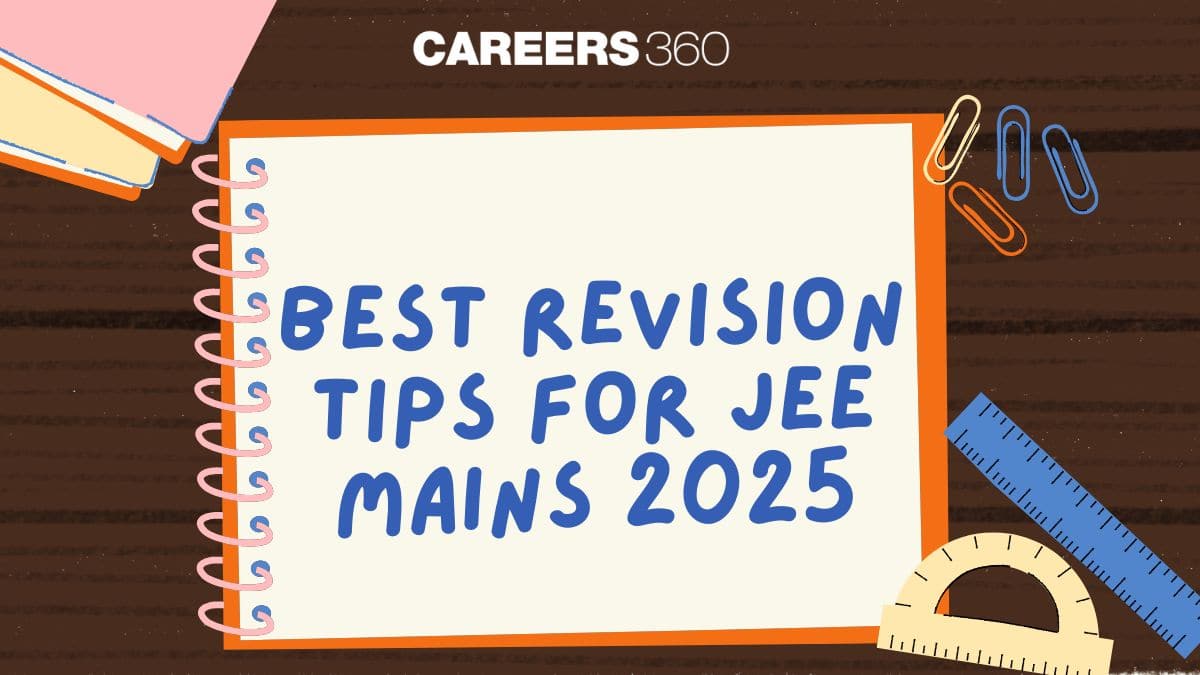MIT World Peace University B.Tech Admissions 2026
Highest CTC 44.14 LPA | UGC Approved | 1600+ Recruiters | 100% Placement
JEE Mains April session is right around the corner and everyone is now looking for the best strategies to ace their revisions. If you are also looking for the best revision tips for JEE Mains 2025 April session then this article is exactly for you! Revisions are sort of tricky as it can build or blast your main day, which is why having a proper JEE Main revision strategy is very important.

In this article, we will provide you with the HOLY MANTRAs of Quick revision tricks for JEE Mains. We will also provide you with some materials that you can refer to for your preparation to maximize retention and accuracy. Now, let’s quickly get into the Last Minute revision tips for JEE Mains 2025 to ace your April Session:
10 Best revision tips for JEE Mains 2025 are as follows:
The extensive syllabus of JEE Mains holds various topics with different value levels. Students should start their study with Modern Physics, and Electrostatics and Thermodynamics followed by Coordinate Geometry and Organic Chemistry which represent high-scoring topics for JEE Mains syllabus. Starting your revision with important topics allows you to focus on the most scoring sections prior to studying lower-scoring areas. Your order should follow highest weighted topics to least weighted ones.
JEE Mains includes a wide range of content yet some sections matter more than others in the examination. Study primarily the topics that yield higher scores in Modern Physics, Electrostatics, Thermodynamics, Coordinate Geometry and Organic Chemistry sections. The first step should be reviewing your high-scoring subjects to address the most important content before moving forward for the remaining parts. You need to step in and make the JEE Main revision strategy that works for you depending on your way of studying.
The most effective revision strategies include personalized brief notes together with formula lists and mind maps that students create themselves. The best revision tips for JEE Mains 2025 serve as efficient tools for both final preparatory work and strengthening core concepts. Your revision notes should include all essential formulas combined with reaction mechanisms along with shortcut techniques which help you work faster.
The proven method to boost confidence involves solving question papers from previous years of JEE Mains. Previous JEE Mains questions provide important benefits regarding familiarizing students with test format and common questions alongside teaching better time usage skills. Real exam conditions are better simulated through mock tests which measure your understanding while decreasing your anxiety levels and allowing you to speed up your test-taking process.
Students can use mnemonics and acronyms and flashcards for effective revision of their Chemistry class material since memorization proves crucial in this subject. The quick revision tricks for JEE Mains simplify the process of remembering complicated information. Study flashcards as an efficient method to relearn physics equations along with mathematical formulas.
Apply additional time specifically to study points that challenge you when reviewing. Watch conceptual videos and use NCERT textbooks alongside peer and mentor discussions for problematic subject material.
The process of revision should be divided into small sessions instead of intense prolonged study blocks. Research indicates that dedicated shorter learning periods lead to higher retention compared to extended extensive studying. Create a balanced revision plan using this Best revision tips for JEE Mains 2025 article which protects you from exhaustion until the examination day.
Economical time distribution plays a fundamental role in achieving success in JEE Mains. When it comes to revision take time to solve mock tests while respecting the designated time limits. Practicing mock exams within their allotted time enables you to solve problems more efficiently and manage pressure situations like those in the actual exam.
Academic success requires both body health and mental clarity which improves learning abilities and concentration. Take sufficient sleep and consume wholesome food throughout your study time while scheduling brief relaxation periods between study sessions. Mental clarity alongside stress reduction emerges from both exercise practice and meditation practice.
As the exam date nears, follow these last-minute revision tips for JEE Mains to stay on top of your preparation:
Avoid learning new topics at the last moment.
Stick to your self-made notes and revise important formulas daily.
Solve a few mock tests to build confidence.
Stay positive and avoid unnecessary stress.
Syllabus review alone does not fulfill revision goals because students need to strengthen their concepts at the same time they improve their problem-solving abilities and optimize their examination tactics. The implementation of an organized revision strategy leads to detecting academic weaknesses and builds solid content knowledge and maximizes scheduling efficiency. A well-planned approach involving minimal stress alongside comprehensive practice and clear conceptual understanding will achieve success in revision.
Achieving success in the JEE Mains entrance exam requires students to pay attention to both the actual study time and the effective revision techniques for JEE Mains. Your success in JEE Mains will depend on developing both a planned revision method and strategic practice techniques which together will deliver excellence in test performance. These revision strategies for JEE Mains 2025 will provide you with thorough preparation opportunities combined with higher success probabilities. Devote your full attention to revision through successful techniques while providing your maximum effort for the test.
Among top 100 Universities Globally in the Times Higher Education (THE) Interdisciplinary Science Rankings 2026
Recognized as Institute of Eminence by Govt. of India | NAAC ‘A++’ Grade | Upto 75% Scholarships
Among top 100 Universities Globally in the Times Higher Education (THE) Interdisciplinary Science Rankings 2026
70th University Ranked by NIRF | 80th Engineering Rank by NIRF | Accredited by NBA and NAAC A+
Last Date to Apply: 28th Feb | Ranked #43 among Engineering colleges in India by NIRF | Highest Package 1.3 CR , 100% Placements
NAAC A+ Accredited | Among top 2% Universities Globally (QS World University Rankings 2026)